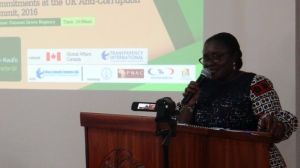GII, Others dialogue Ghana's progress since 2016 UK Anti-Corruption Summit
19 July 2018

The Registrar General's Department is appealing to government to reverse its decision on the 13 percent cap placed on the use of the Department's Internally Generated Funds (IGF).
Formerly, the Registrar General's Department was allowed to use 20 percent of its IGF but that has been reduced to 13 percent.
The Registrar General, Jemima Oware said the lack of funds is affecting the effective work of the Department, more especially as it has the added task of combating corruption in business.
She was presenting a paper on progress made on Ghana's commitment to legislation, business and Beneficial Ownership at a round-table in Accra. The session was meant to examine Ghana's progress since the 2016 UK Anti-Corruption Summit, was over-subscribed.
Organizers of the dialogue, Ghana Integrity Initiative, GII, the Local Chapter of Transparency International, Commission on Human Rights and Administrative Justice, CHRAJ, National Commission on Civic Education, NCCE, Africa Parliamentary Network Against Corruption, APNAC, and on-line hub, Pen Plus Bytes who teamed up to champion the discussion attributed the high turn out to a heightened interest Ghanaians seem to have in corruption issues lately.
It is the wish of anti-corruption advocates that the interest will translate to fighting corruption in deed and not only in words.
Former Chairman of the AU Advisory Board on Anti-Corruption, Daniel Batidam commended the media for contributing to successes in Ghana's fight against corruption. “Winning the fight against corruption requires reasonable transparency in businesses, especially in knowing who are the actual kingpins behind business. This is a task at the door step of the Registrar General's Department” he added.
The department however speaks of being financially handicap and wants government to allow it to use all its IGF to run the Department.
According to the Registrar General Jemima Oware and the Executive Director of GII, Linda Ofori -Kwafo all Local Chapters of Transparency International have tasked the leadership of African countries to redouble their efforts put energy in sensitizing their peoples on how corruption impacts education and push for the creation of mechanisms to strengthen the whistle blower complaints, so as to encourage others to report corrupt practices.
The National Commission for Civic Education, NCCE envisages the day when civics will be re-introduced into the curriculum for basic schools.
Deputy Chairperson, Samuel Akuamoah said civic education will “immunize” the next generation against corruption. For the religious, corruption is a moral failure.
Sheik Aremeyaw Shauib, from the Chief Imam's Office did not mince words by describing Christians and Muslims as hypocrites when it comes to naming corrupt persons. He wondered why Churches are filled to capacity on Sundays, and mosques have little room for movement on Fridays, and yet corruption persists.
Corruption is seen as a canker really hurting society, honesty on the part of all perhaps might push the fight against corruption further.
Story: Rebecca Ekpe
gbcghanaonline.com

